This blog post is based on the guest presentation at the Blockchain in Digital Business course at University of Jyvaskyla, later also made available as a Twitter thread.
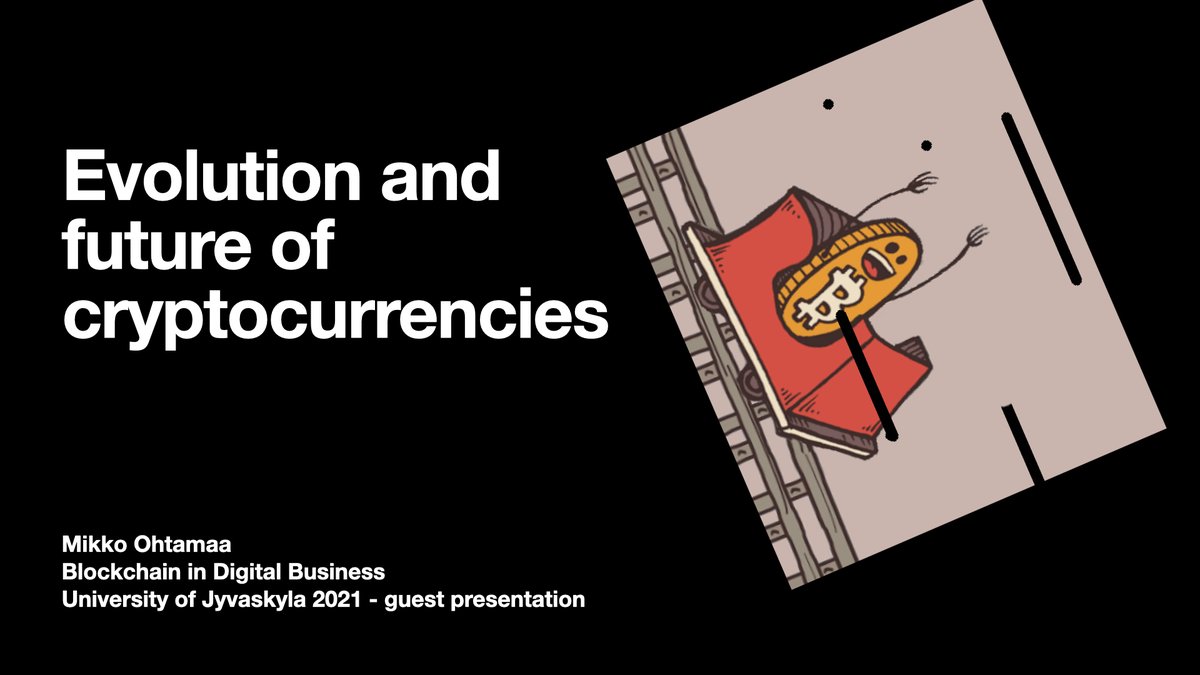 1/ The evolution and future of cryptocurrencies... or how we ended up with where are today with #Bitcoin, #DeFi and blockchains.
1/ The evolution and future of cryptocurrencies... or how we ended up with where are today with #Bitcoin, #DeFi and blockchains.A (long) thread.
👇👇👇
Hold tight, I'll be your ride operator.
As far as I know, it is the first interdisciplinary course on blockchains in Finland, and likely one of the firsts in Nordics.
When we explore the topic of cryptocurrencies we can look at them from few different perspectives.
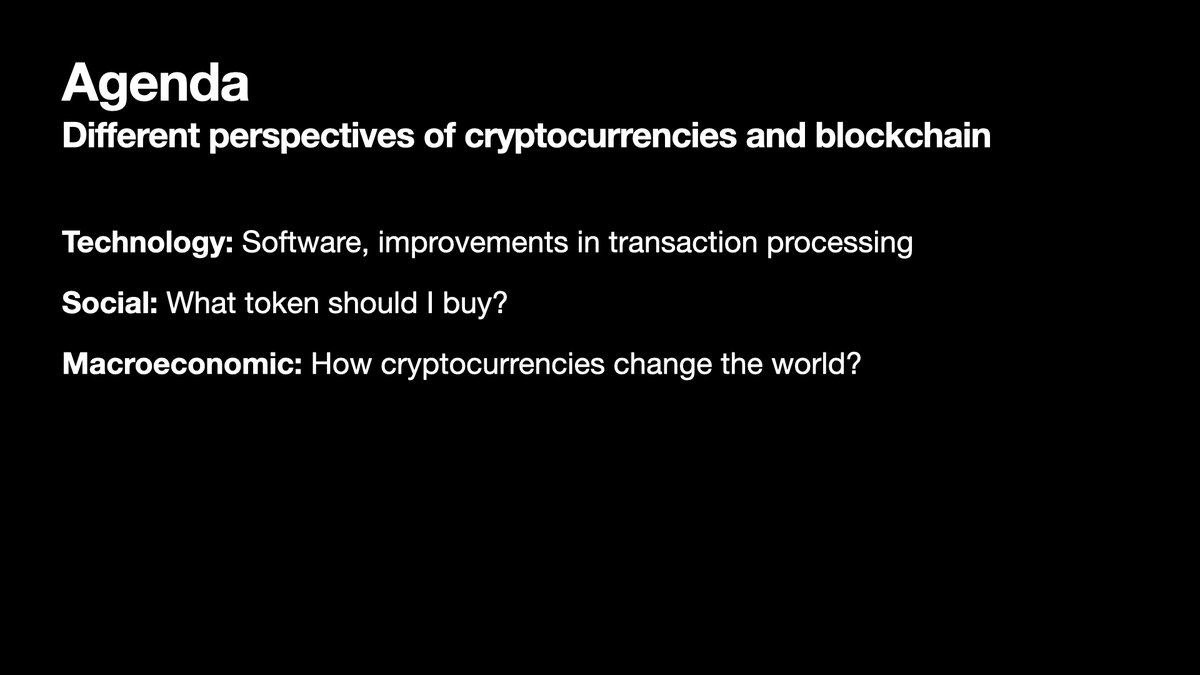 5/ One perspective is technical: how blockchains, technologies underpinning cryptocurrencies, are programmed in past, now and in the future.
5/ One perspective is technical: how blockchains, technologies underpinning cryptocurrencies, are programmed in past, now and in the future.This is mostly related to computer science, cryptography and math theory.
What makes one blockchain better over another?
How did Bitcoin evolve to separate coins, each one of them having a cult following?
This perspective mainly discussed the evolution of crypto communities and the purpose of the movement.
This relates to fiscal and monetary policy and is especially topical now during the time of pandemic when governments are getting massively in debt.
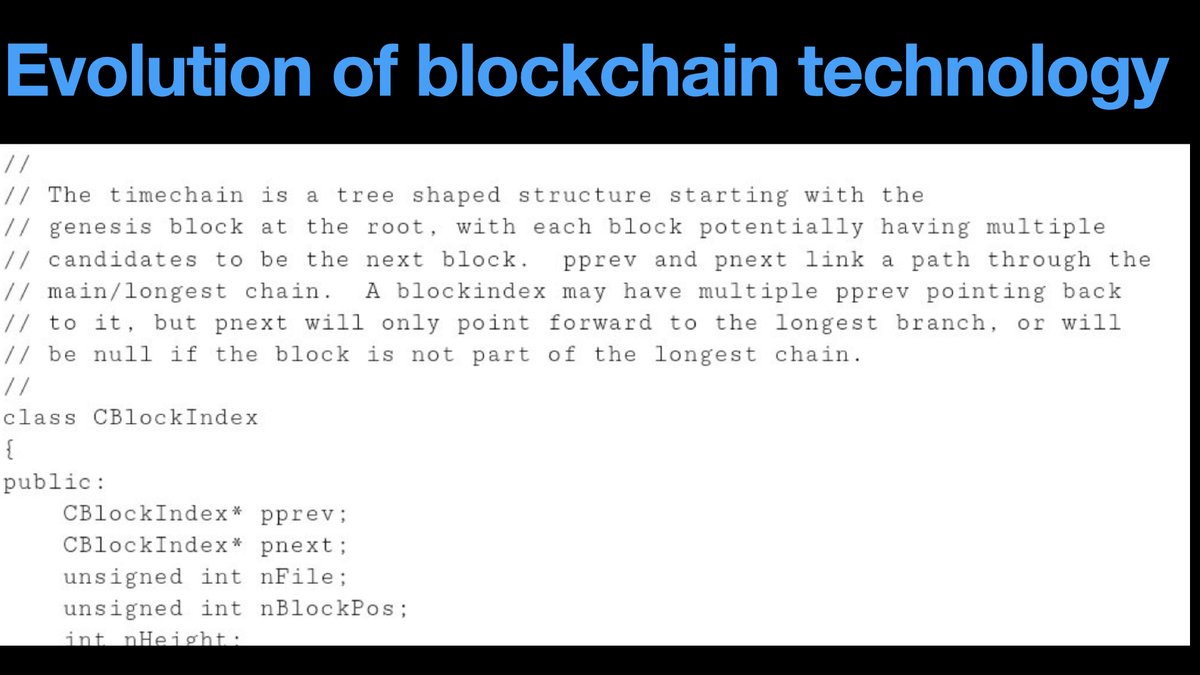 11/ First we look at the technological perspective: elements, architecture and programming of the blockchains.
11/ First we look at the technological perspective: elements, architecture and programming of the blockchains.The change in technology is fundamental to understand the cultural elements later.
👇👇👇
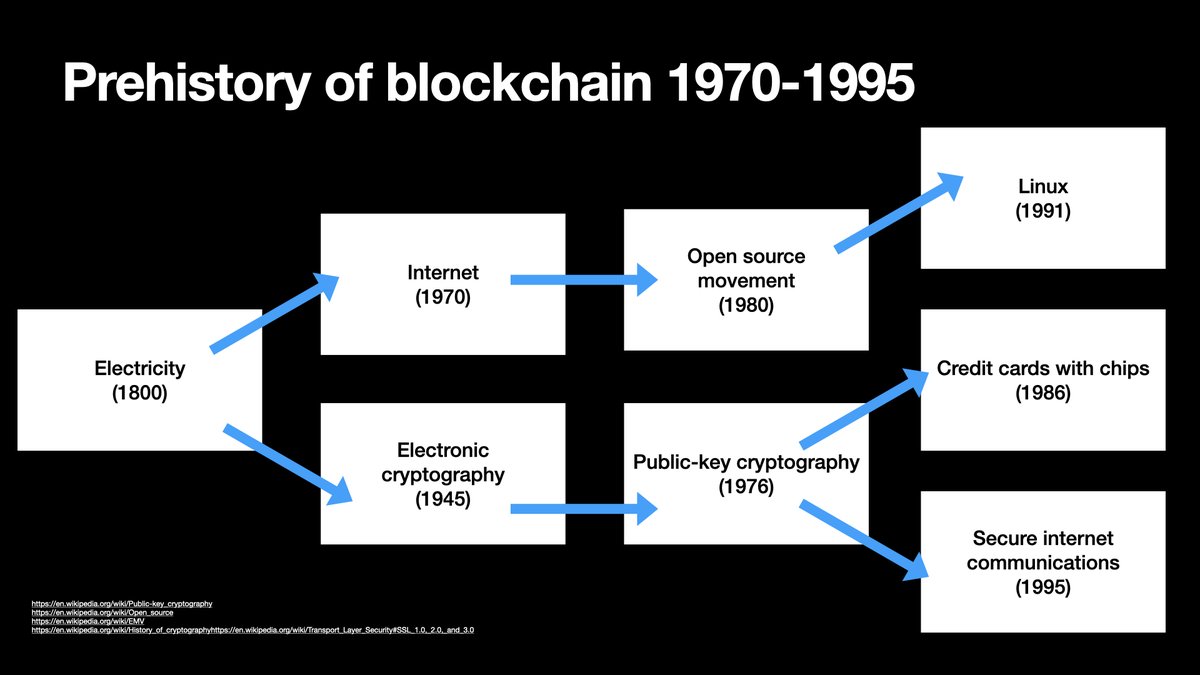 13/ The most important is establishing the internet. We did not have "good enough cables" until 00s.
13/ The most important is establishing the internet. We did not have "good enough cables" until 00s.
Instead of having a central server which is easy to take down the data is distributed across all the network.
By attaching the required few hashes of proof-of-work for every inbound email, making sending emails would become too costly for spammers
I am not aware of earlier implementations.
It had become obvious that proof-of-work is quite an energy hog. All energy going to solving those hashes can be seen as waste if it can be avoided.
PeerCoin presented proof-of-stake.
We had the energy consumption of cryptocurrencies solved by Peercoin already back in 2012.
Today, all modern blockchains follow a variation DPoS model. An active smaller set of block producers are chosen by delegating votes. This makes consensus decisions faster.
This is why there is no #DeFi on Bitcoin. en.bitcoin.it/wiki/Script
These smart contracts had storage which then could enable use cases like tokens and DEXes.
There has not been much innovation going in Bitcoin, or it has been snail-paced.
You might have heard of Java VM or Python VM.
 37/ EVM and its programming language @soliditylang are very use case focused and narrow. They can do little computing, slowly, similar to a dumb phone from 1999.
37/ EVM and its programming language @soliditylang are very use case focused and narrow. They can do little computing, slowly, similar to a dumb phone from 1999.
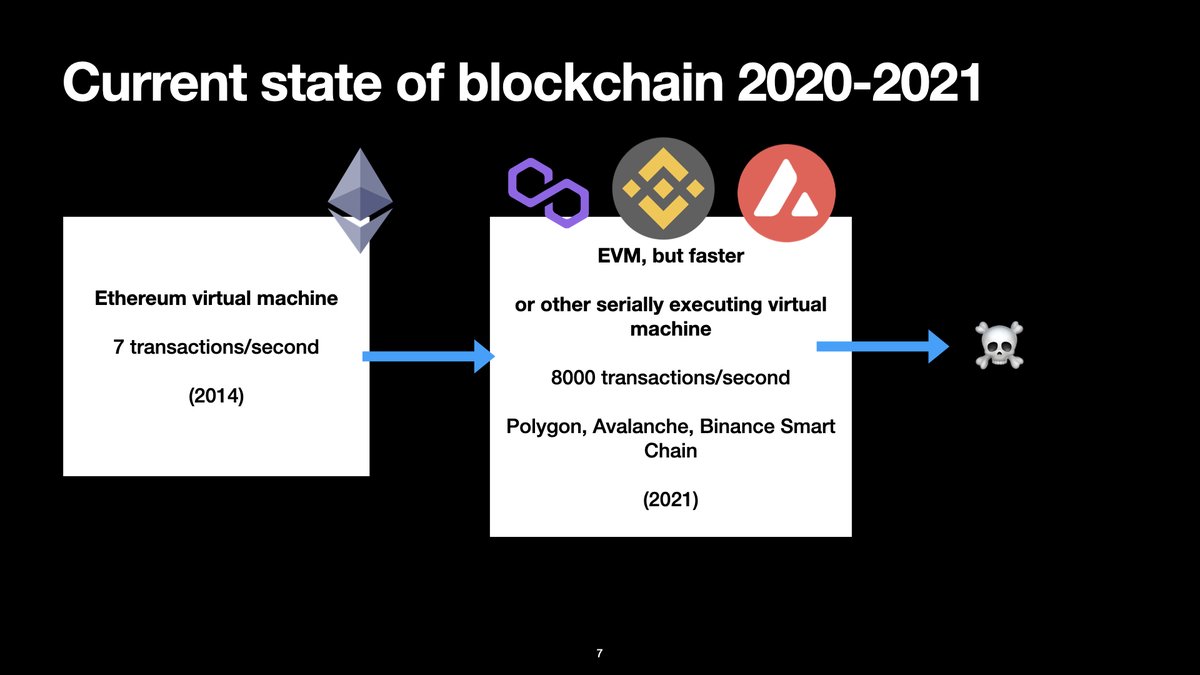 39/ We are now living in 2021. The current state of public blockchains (which run cryptocurrencies) is that Ethereum 1.0, with its proof-of-work, is still dominating.
39/ We are now living in 2021. The current state of public blockchains (which run cryptocurrencies) is that Ethereum 1.0, with its proof-of-work, is still dominating.
There had been EVM clone attempt earlier like @RSKSmart and @Tronfoundation but none of these became hugely popular.
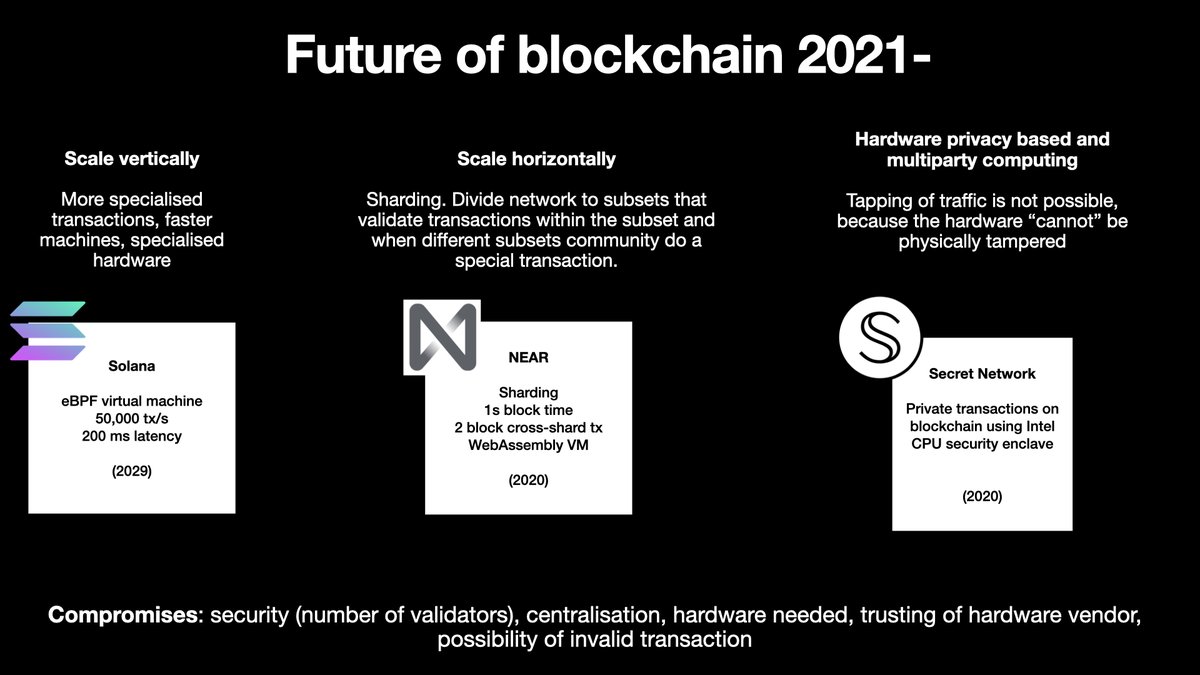 42/ Luckily, we already have a theoretical understanding of how to break these limitations and make blockchains scale further. And we have some of these blockchains already in production.
42/ Luckily, we already have a theoretical understanding of how to break these limitations and make blockchains scale further. And we have some of these blockchains already in production.
They claim 50k tx/s.
This is how large databases (Google, etc.) scale - by sharding
Their value promise is that the blockchain code runs on the secure element of Intel CPUs. What happens inside the CPU cannot be tapped and it keeps it secure.
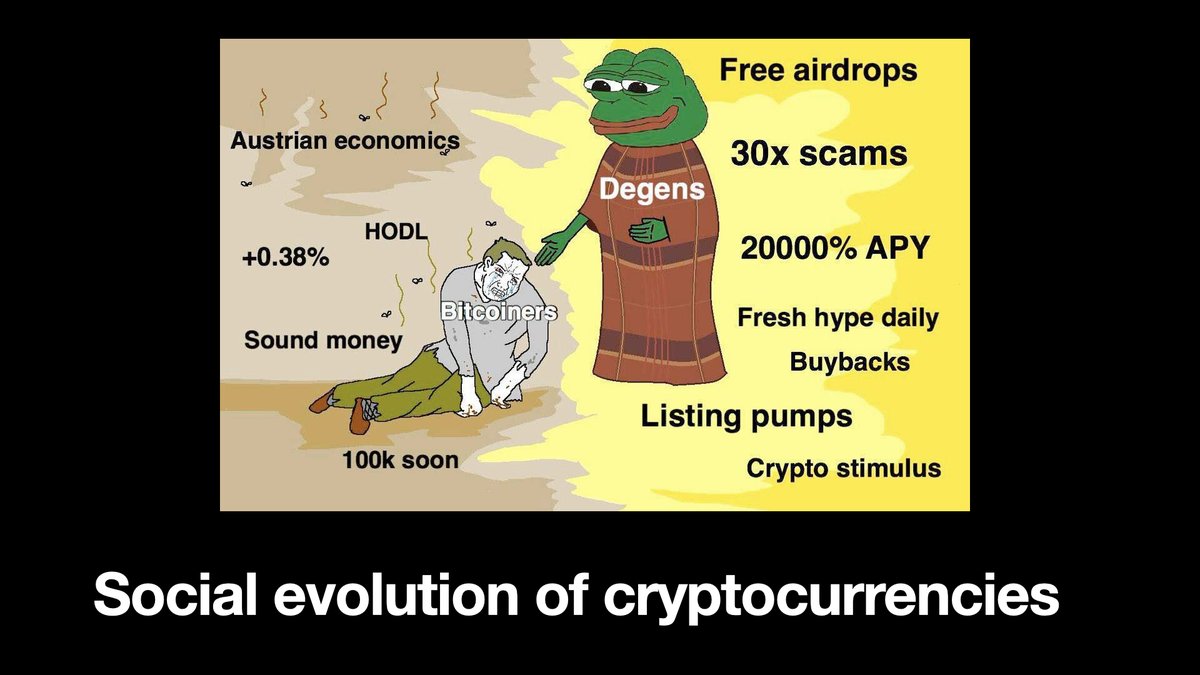 47/ Now let's talk about cultural aspects
47/ Now let's talk about cultural aspects How crypto projects and communities have evolved; what kind of waves there have been and will be?
👇👇👇
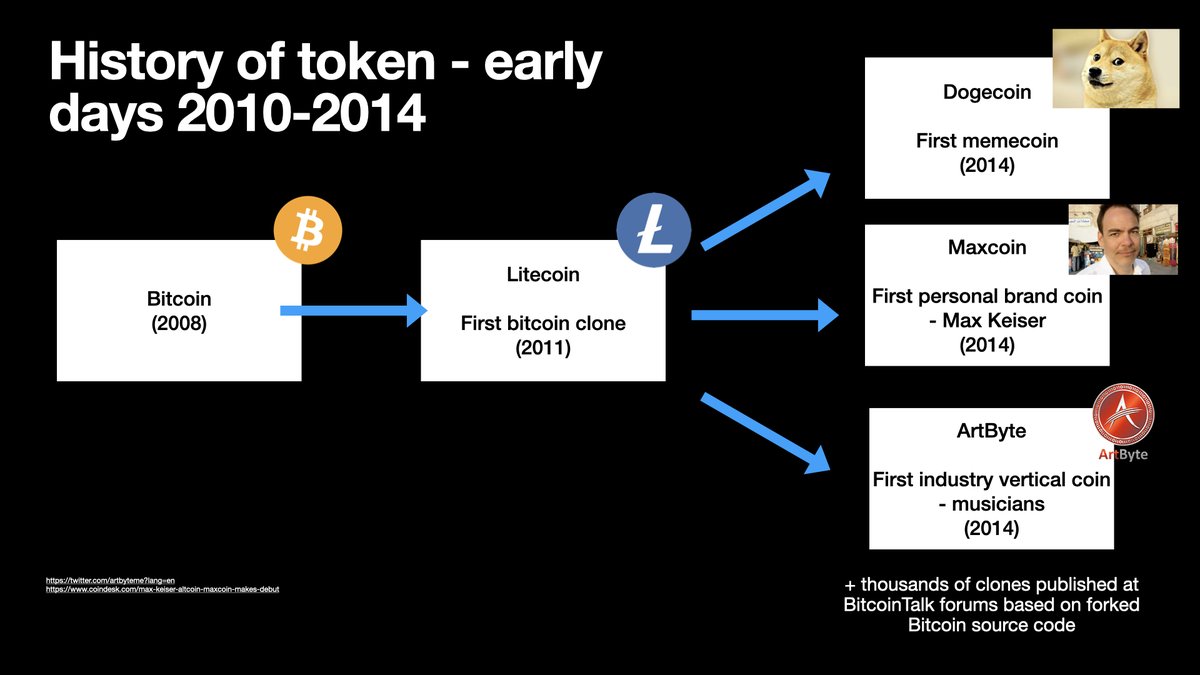 48/ We all know it started with #Bitcoin.
48/ We all know it started with #Bitcoin.Bitcoin is the most valuable cryptocurrency because being the first it has so much trust momentum behind it. Countless years without failures and being stable. It can be trusted by most conservative audiences.
The first "fork" of Bitcoin was @litecoin in 2011 by @satoshilite.
Forking is a term for cloning an #opensource codebase.
But what it did culturally cannot be underestimated.
People figured out there is easy money to be milked from investors by trying to replicate the early Bitcoin value appreciation with "scarcity."
I call the period of 2012-2015 the original altcoin years.
Originally term altcoin was coined to mean any Bitcoin clone.
@BitcoinTalk, the largest community forum was filled with these forks.
Luckily mining with CPU was still a thing by the time.
Giving yourself some extra coins at the start was called "premine."
Dogecoin technical parameters are so ridiculous that its blockchain barely works.
Like MaxCoin, most of these altcoins went the way of the dodo, because they did not create any value.
Dogecoin stayed because it was a bad joke and bad jokes do not die easily.
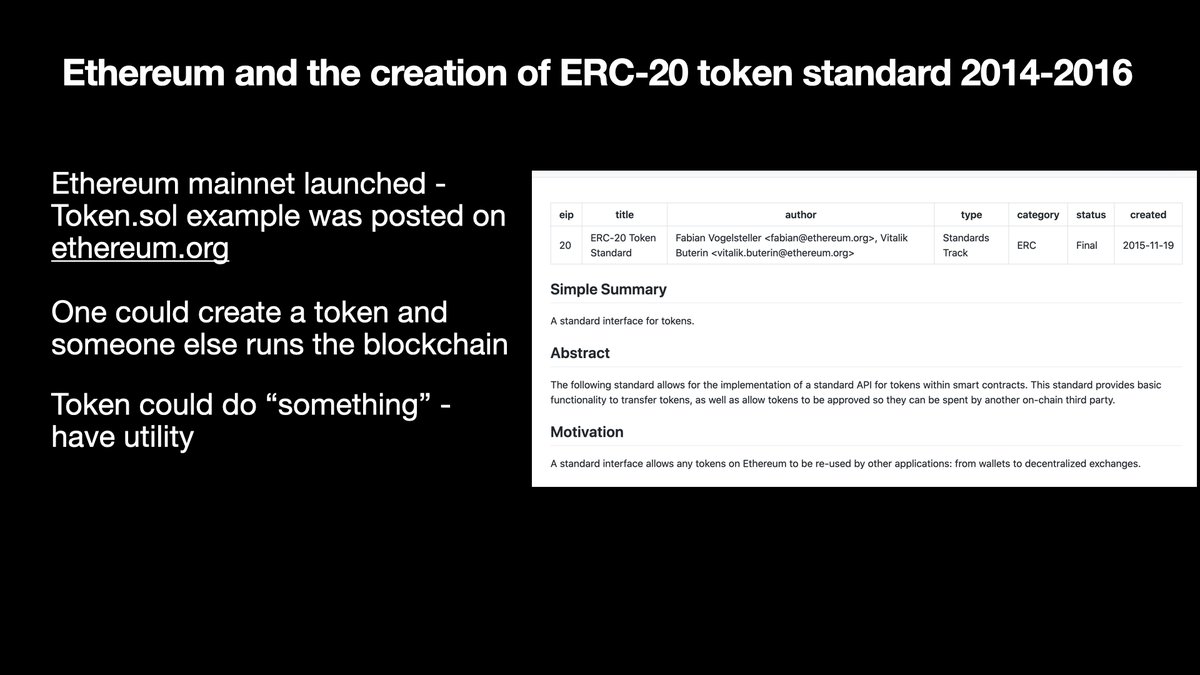 60/ Then, the launch of #Ethereum in 2015, was a game-changer.
60/ Then, the launch of #Ethereum in 2015, was a game-changer.Creating a new token did no longer needed running your own blockchain.
Pre-ERC-20 token contract Solidity source code was posted as an example for people to fiddle.
The utility token was born.
FirstBlood token now lives as @DawnProtocol
$100M in ETH was very notable by the time. Now this $ETH would be worth of around $30B - $50B."
Some miners continued one chain, while the others continued another.
Puritan work, @EthereumClassic ($ETC), is not much a player today, in the terms of activity.
Turned out code is not the law, but the social consensus is the law.
"Blockchain is supposed to be immutable, or it is a joke" puritans toted.
@coindesk was cold and hostile towards #Ethereum for years to come.
The late 2016 ICOs had been very successful. They were sold out in minutes.
People had taken notice.
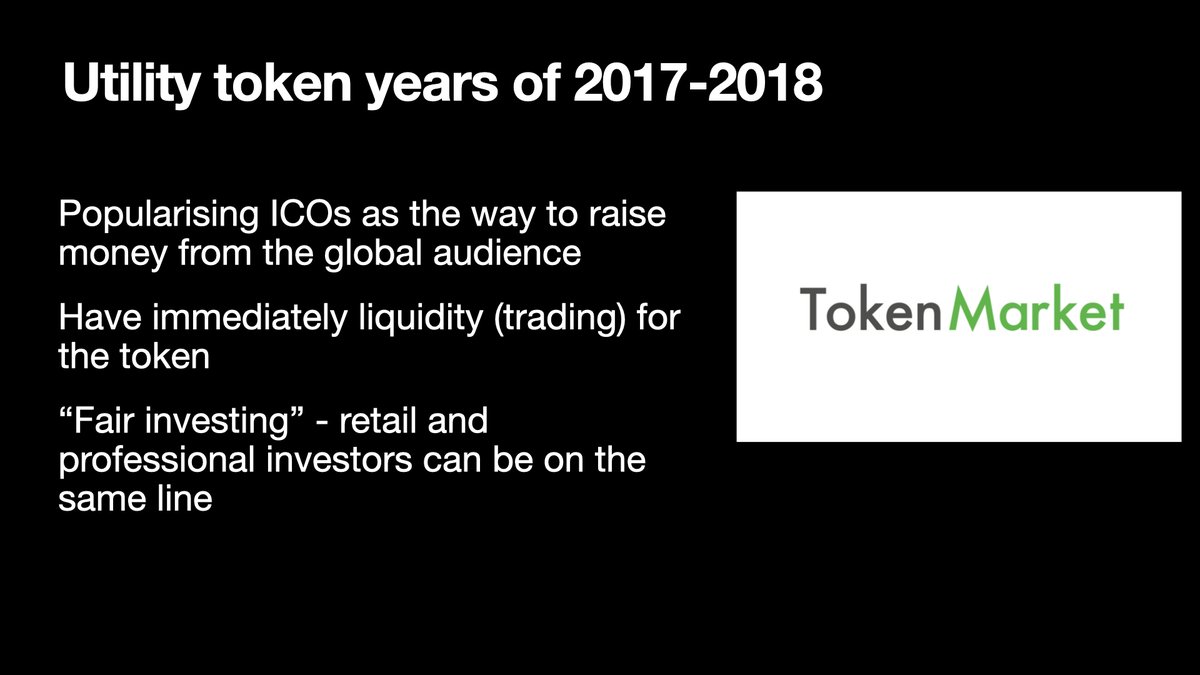 78/ 2018-2018 were the utility token years.
78/ 2018-2018 were the utility token years. What had been the original altcoin boom was now replicated on #Ethereum.
Different ICOs started to pop out left and right. Some of them made sense, most of them not.
... there had been an option to raise money from the global audience
... immediately liquidity for your investment
... professional (VC) and retail investors able to get the same terms
But also, a lot of them were neutered because they had to circumvent the security laws, mostly in the US, as anything being securities cannot trade on a cryptocurrency exchange.
Fundamentally, unless you have discounted cash flows, your investment is not worth much. The artificial scarcity argument takes you only so far.
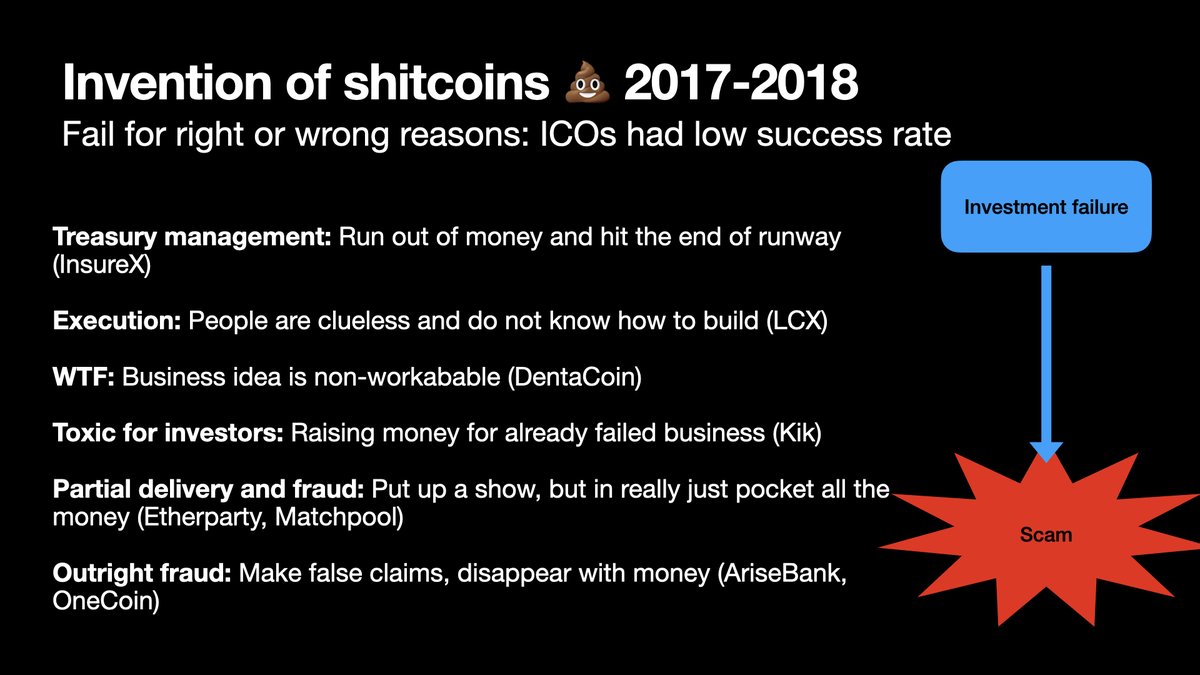 82/ The ICO craziness led to the creation of the term "shitcoin."
82/ The ICO craziness led to the creation of the term "shitcoin."A worthless token that failed or is likely to fail.
I believe I have helped to create more shitcoins than anyone else on this planet.
Here are some of my examples and observations of why ICO tokens failed:
ETH dipped to 1/10th and suddenly your big raise was not that big.
@dentacoin - let's create money for dentist services. coingecko.com/en/coins/denta…
A lot of projects raised money with real promises, no lies there but never planned to deliver.
We can give the benefit of the doubt for the business idea, like with Kin, but looks like the Israeli founder moved forward from his home country, taking the raised money stash with him.
A lot of these were run by convicted criminals with new aliases.
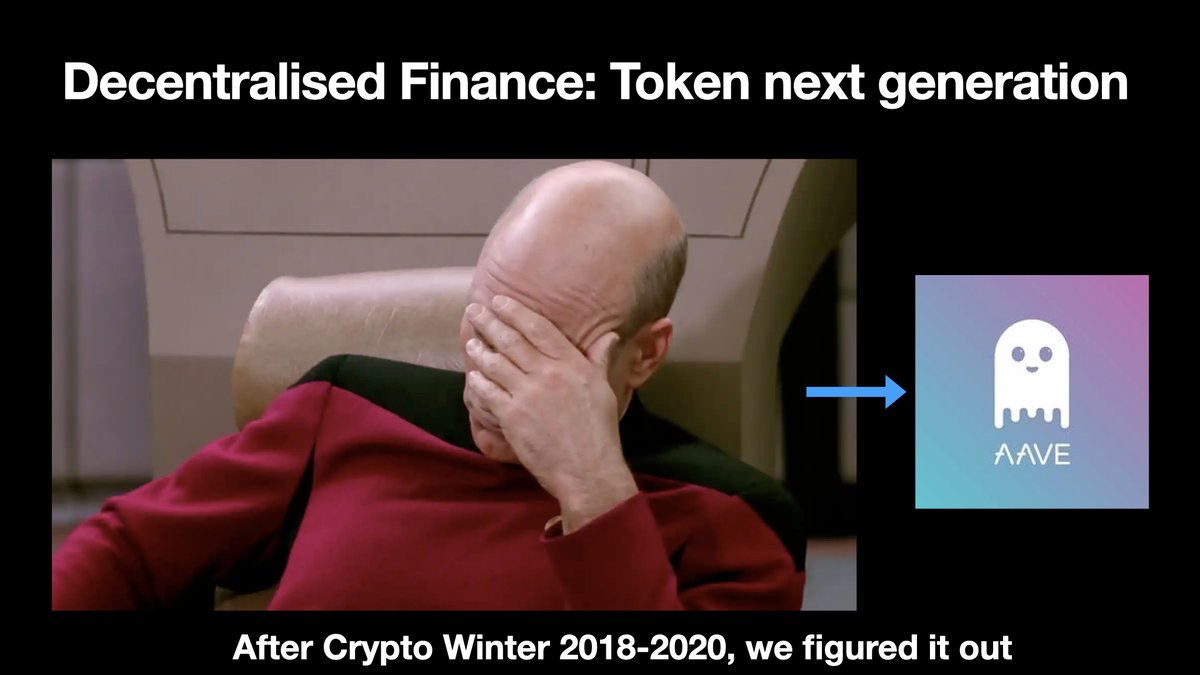 101/ 2018 did not end that well for the crypto. A lot of mistakes were made, a lot of money was lost.
101/ 2018 did not end that well for the crypto. A lot of mistakes were made, a lot of money was lost.Years 2018-2019 are called "crypto winter" because we saw a massive correction in cryptocurrency prices. The industry fell into hibernation.
“Steel is strong because it knew the hammer and white heat.”
Cryptowinter was the time of building.
#buidl hashtag appeared along with the popular #hodl meme
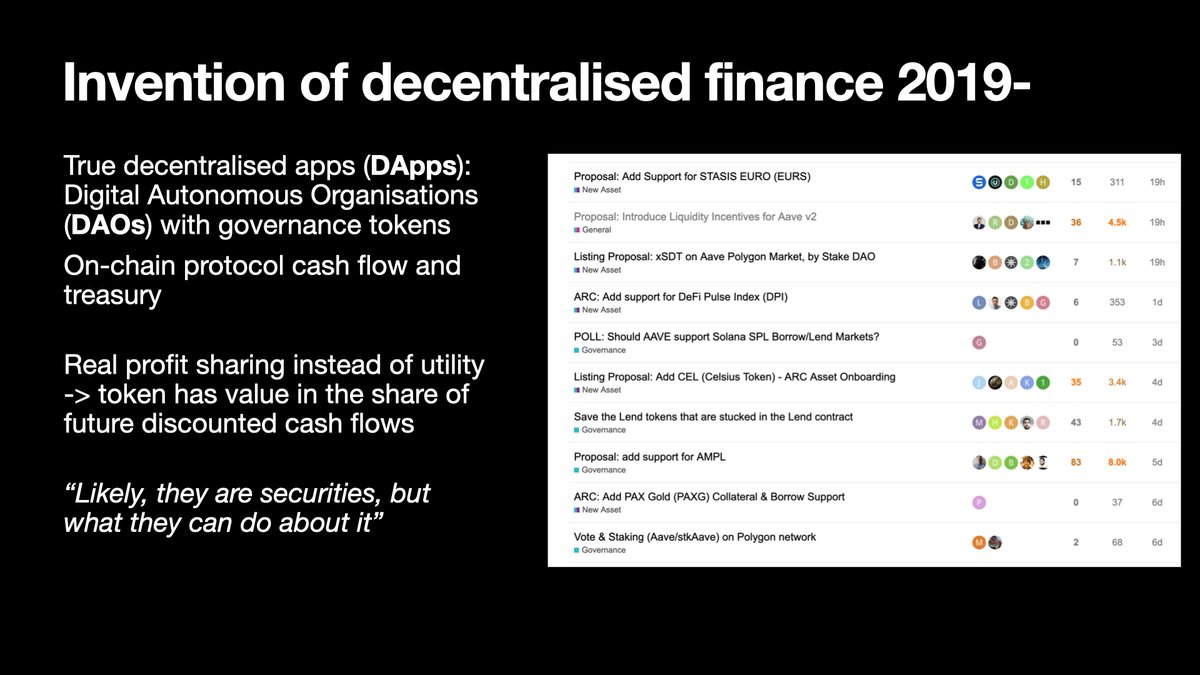 103/ Instead of utility tokens, people started to talk about decentralised finance or #DeFi for short.
103/ Instead of utility tokens, people started to talk about decentralised finance or #DeFi for short.A true DeFi protocol has few major differences for ICOs and utility token boom:
There are no centralised element into which token holders would not have visibility.
The treasury and cash flows are transparent on-chain.
As a holder of the governance token of a DeFi protocol, you earn dividends or yields.
(Though you can still buy on the secondary market, it puts the project itself at less direct legal risk.)
My answer is highly likely.
Because the DeFi protocol tokens ownership is "sufficiently decentralised" as the @SEC_News would put it.
Unfortunately, it did not have much time to become decentralised enough. The SEC settled with its founder, Zach Coburn.
The exchange was sold and new Chinese owners had no idea how to execute.
(Sidenote: EOS, Solana, NEAR can run full on-chain order book based DEXes)
Uniswap was effectively "Better Bancor, without a vested interest utility token."
Uniswap became very, very, popular.
A synthetic asset tracks the price of a real-world asset (USD), but instead of being backed by dollars on a bank account it is backed large enough collateral of crypto on-chain
This includes other cryptocurrencies (#bitcoin), commodities like oil, but also equities like Tesla.
Almost killed by a crypto winter, Aave is now a DAO behemoth with more than $16B assets under management, bigger and safer than most banks.
Instead of you trading your assets yourself, you deposit them in a Yearn smart contract which will hunt the best yield for you.
Mostly anonymous founding team.
Mostly with little promise how they are going to create value.
But cloning is easy.
It is the same as a scam, but you do not disappear overnight. Anonymous founders disappear after the cloned service they have launched gets "hacked."
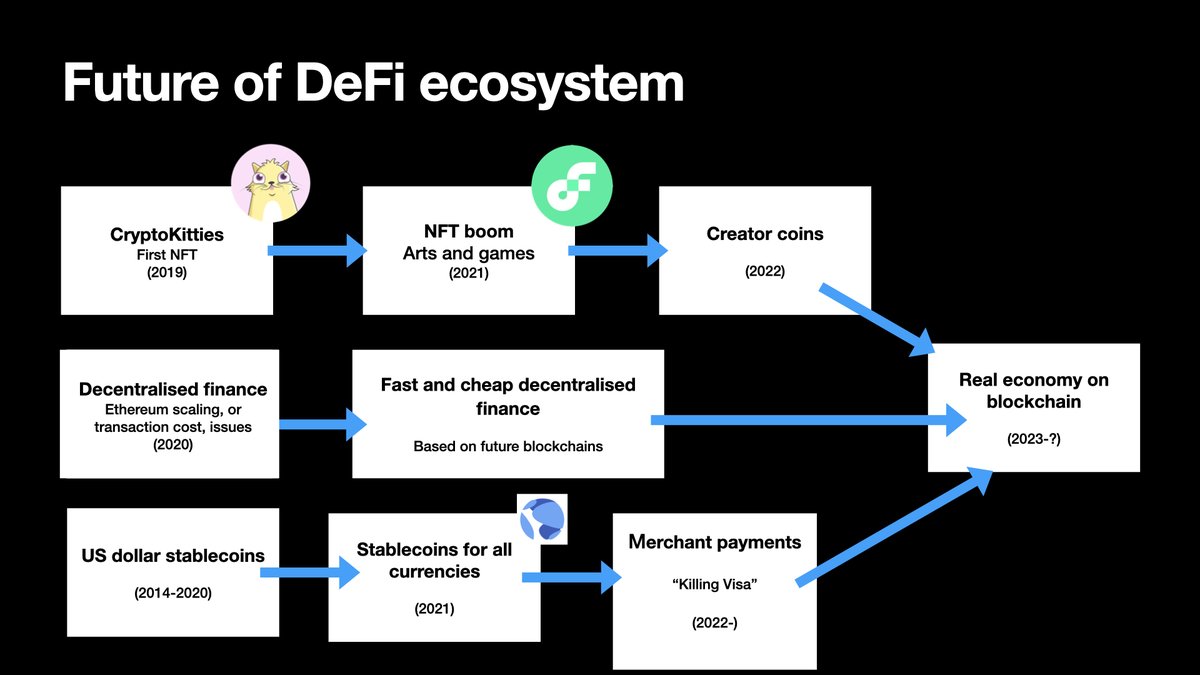 136/ Where do we go from here in 2022-2023?
136/ Where do we go from here in 2022-2023?We are now living in an NFT boom. It has similar characteristics to the ICO boom. The value promise of a lot of projects lacks fundamentals. It is likely the whole NFT industry experiences severe devaluation.
Digital peer-to-peer cash
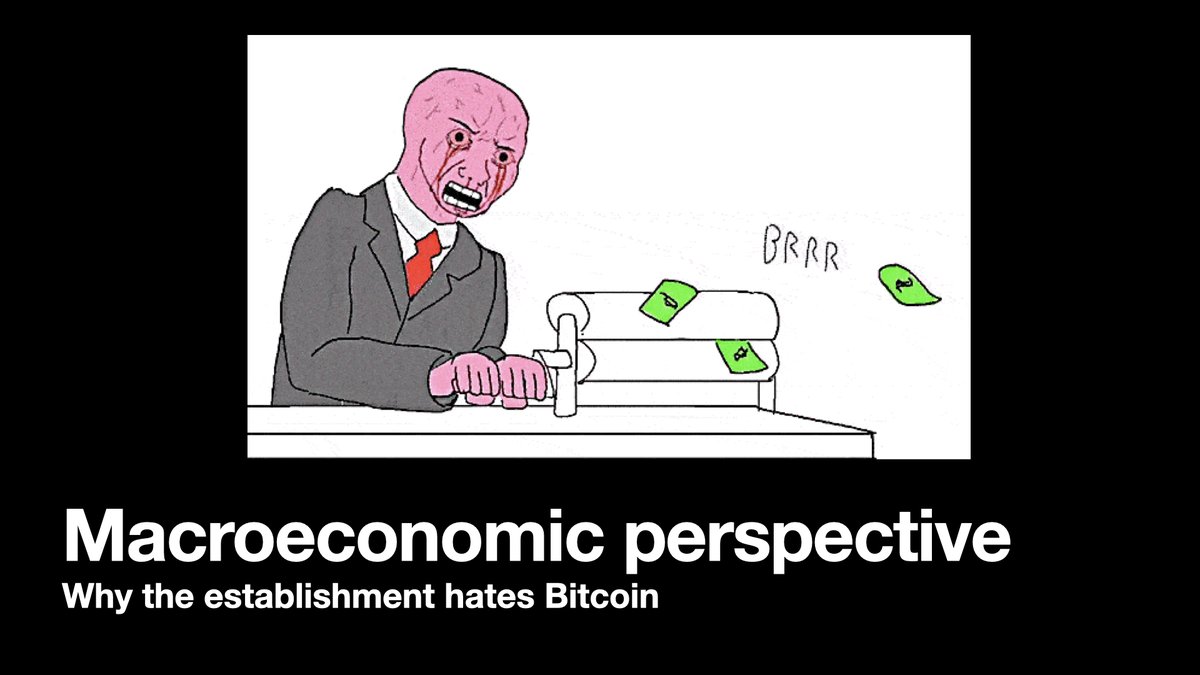 142/ [FIN of culture section]
142/ [FIN of culture section]Now let's talk about macroeconomic aspects.
Technology and culture narratives above show that crypto communities are onto something and we want to understand what this means for the world economy.
👇👇
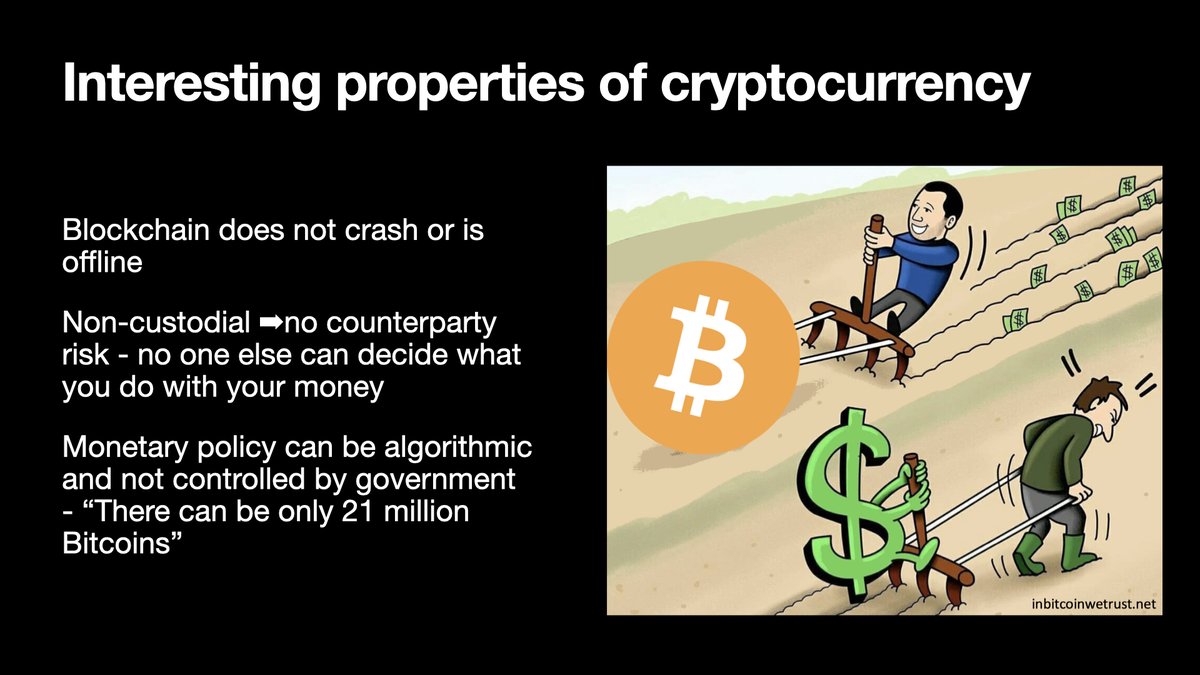 143/ Macroeconomics mostly focus on #Bitcoin, because Bitcoin is the cryptocurrency with most of the trust backing it up.
143/ Macroeconomics mostly focus on #Bitcoin, because Bitcoin is the cryptocurrency with most of the trust backing it up. World bankers are talking about Bitcoin, they do not talk about $ETH yet.
Better money for payments: in theory, you do not need to give a due date for your invoices, because the customer should be able to settle them instantly, assuming they are not illiquid
But this brings little comfort for business-to-business trade that most world trade is.
This is especially true in the era of pandemics, because, oh boy, governments are printing money.
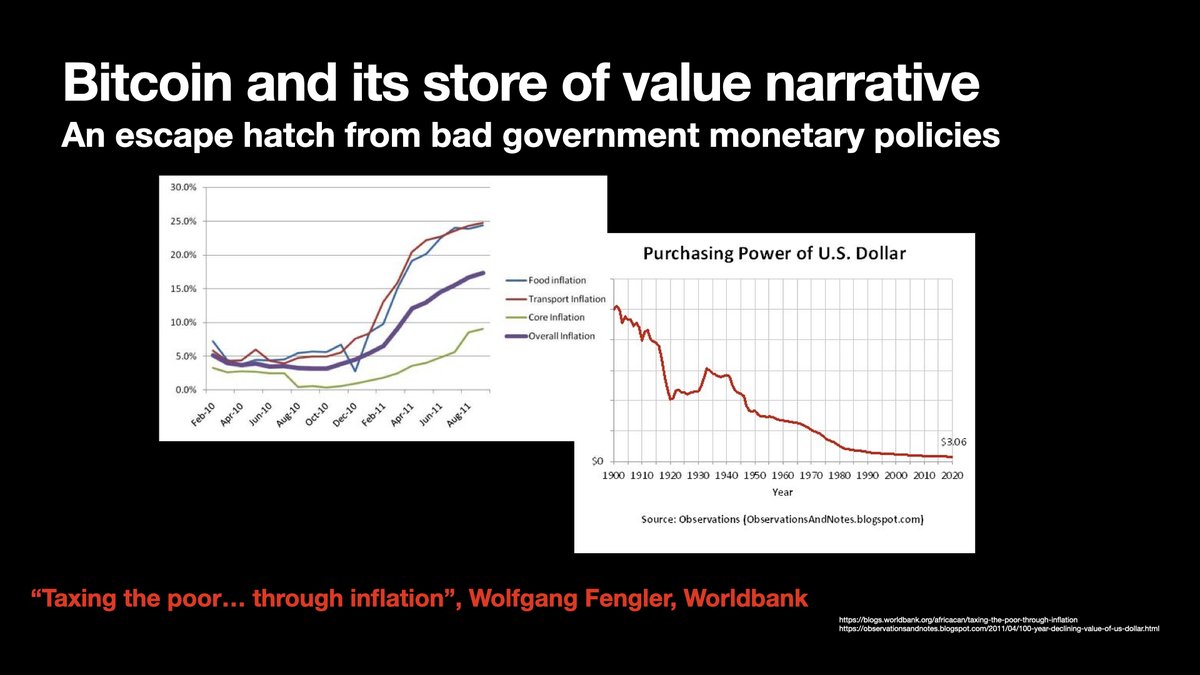 148/ This brings us to "store of value" narrative.
148/ This brings us to "store of value" narrative.Bitcoin is a better store of value, because it cannot be taken away from you easily, either by confiscation or by inflation.
Or... every second you hold your money in a bank it's losing value, faster or slower.
Or opposite... top %1 accumulates more wealth because they have proportionally more to invest.
And now with the excessive government borrowing spree of pandemics, some expect every country will join this club.
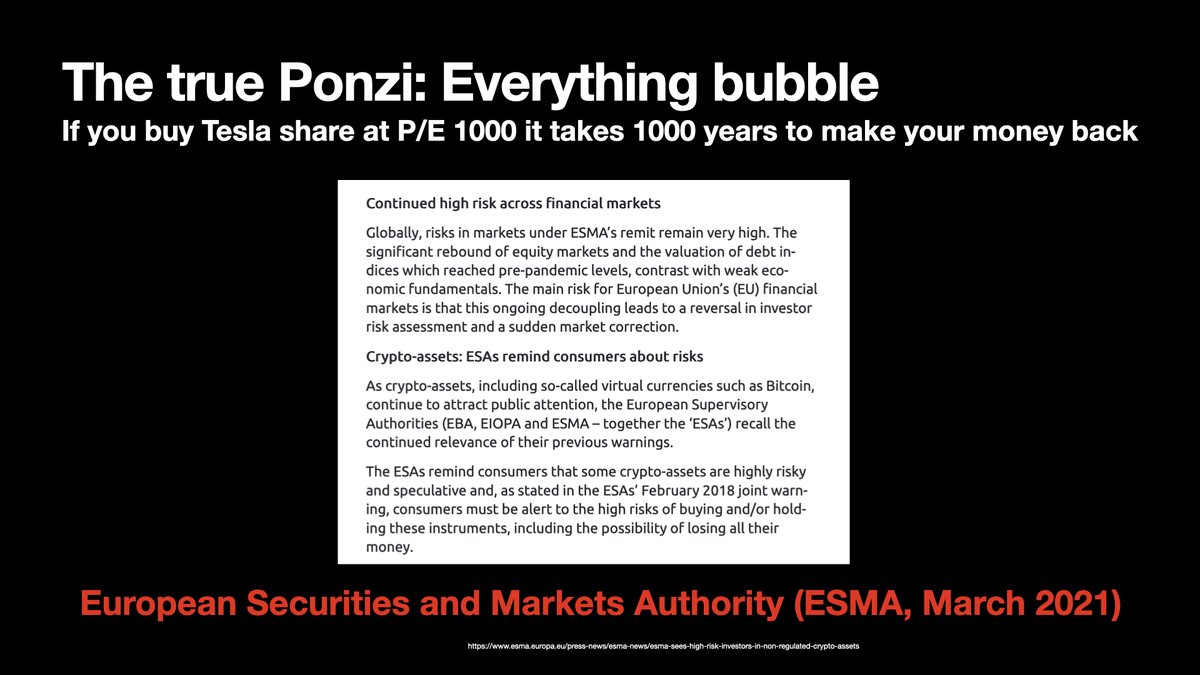 153/ "Cryptocurrencies are in a bubble, you need to be careful when buying them."
153/ "Cryptocurrencies are in a bubble, you need to be careful when buying them."I agree with this sentiment because the valuations have gone up way too fast.
Even @ESMAComms - the highest securities authority in the EU, is saying no matter what you are buying, including stocks, you are going to get a very bad deal at the moment.
A friendly, and easy to read, introduction to the topic can be found in this newsletter by @LynAldenContact lynalden.com/quantitative-e…
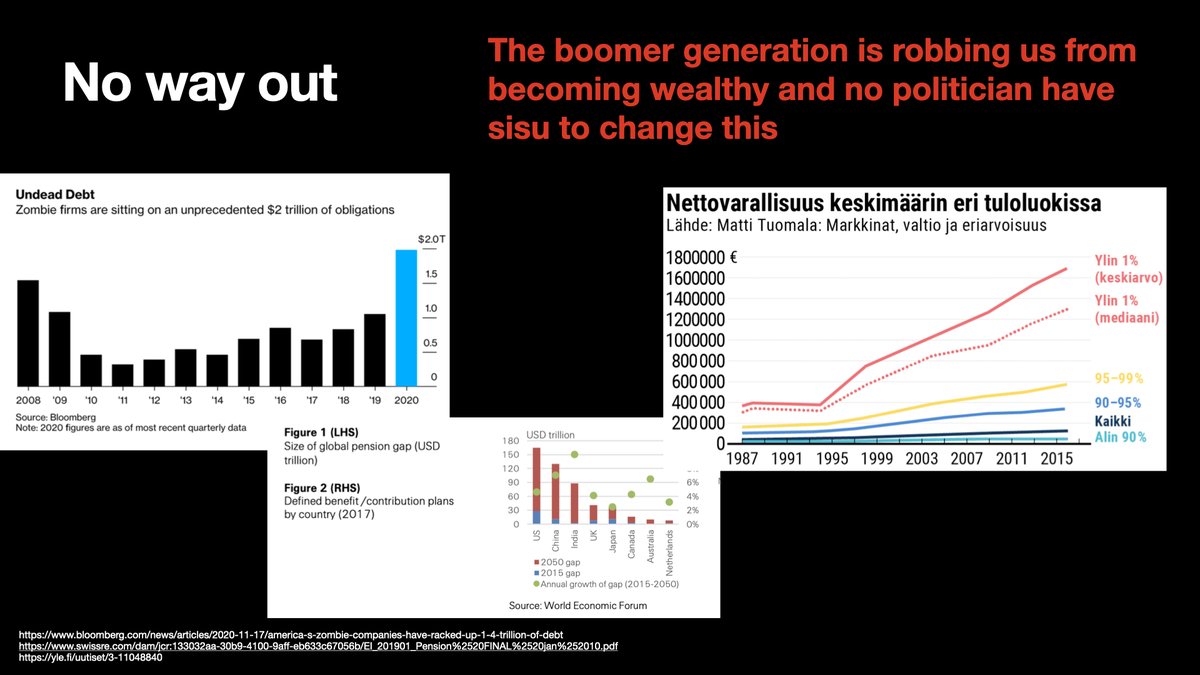 158/ The most notable ponzi is pension funds all around the world. This is called the pension gap.
swissre.com/dam/jcr:133032…
158/ The most notable ponzi is pension funds all around the world. This is called the pension gap.
swissre.com/dam/jcr:133032… No politician will drive a policy against the establishment that would put them effectively out of power in the next election.
You can call it a pyramid, you can call it fraud, but it is the smaller evil of two. Even if the economic doomsday scenario by implosion were unlikely, there might be a small chance for it happening and it is better to have plan B.
Because boomers have robbed generations of having means to become wealthy otherwise; Buyers are buying lottery tickets in hoping it will lift them over the edge.
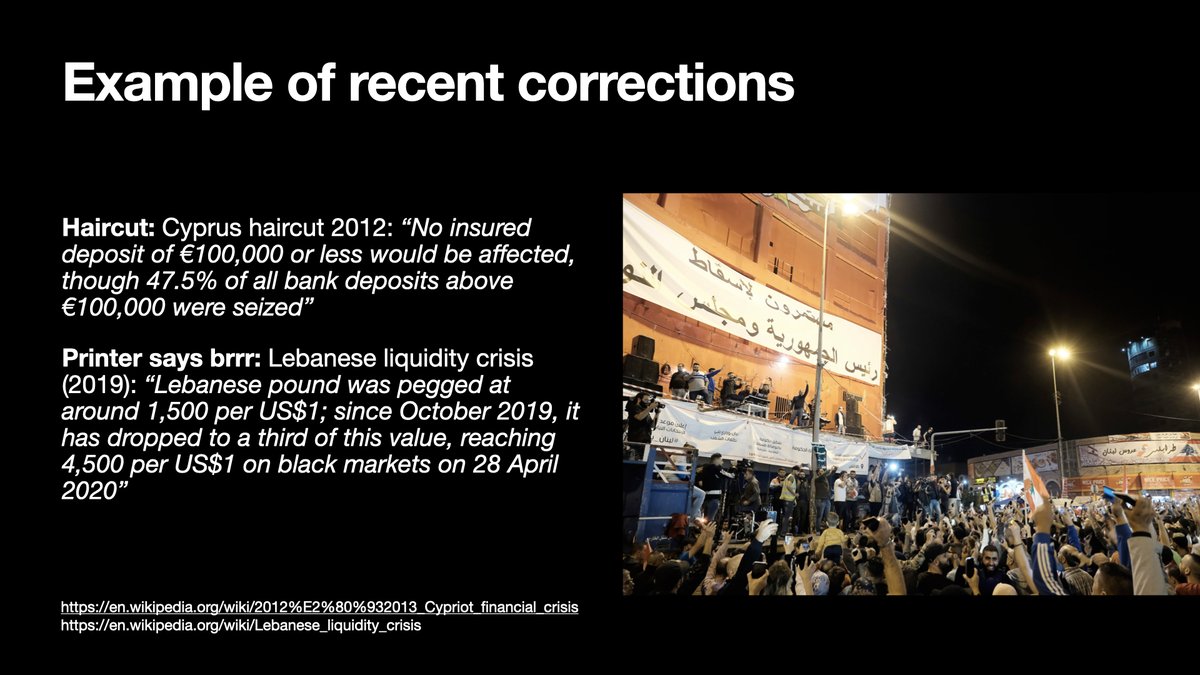 166/ We have plenty of historic and modern examples of what is going to happen when things finally go sour.
166/ We have plenty of historic and modern examples of what is going to happen when things finally go sour.
Lebanese pound was pegged at around 1,500 per US$1; since October 2019, it has dropped to a third of this value, reaching 4,500 per US$1 on black markets on 28 April 2020.
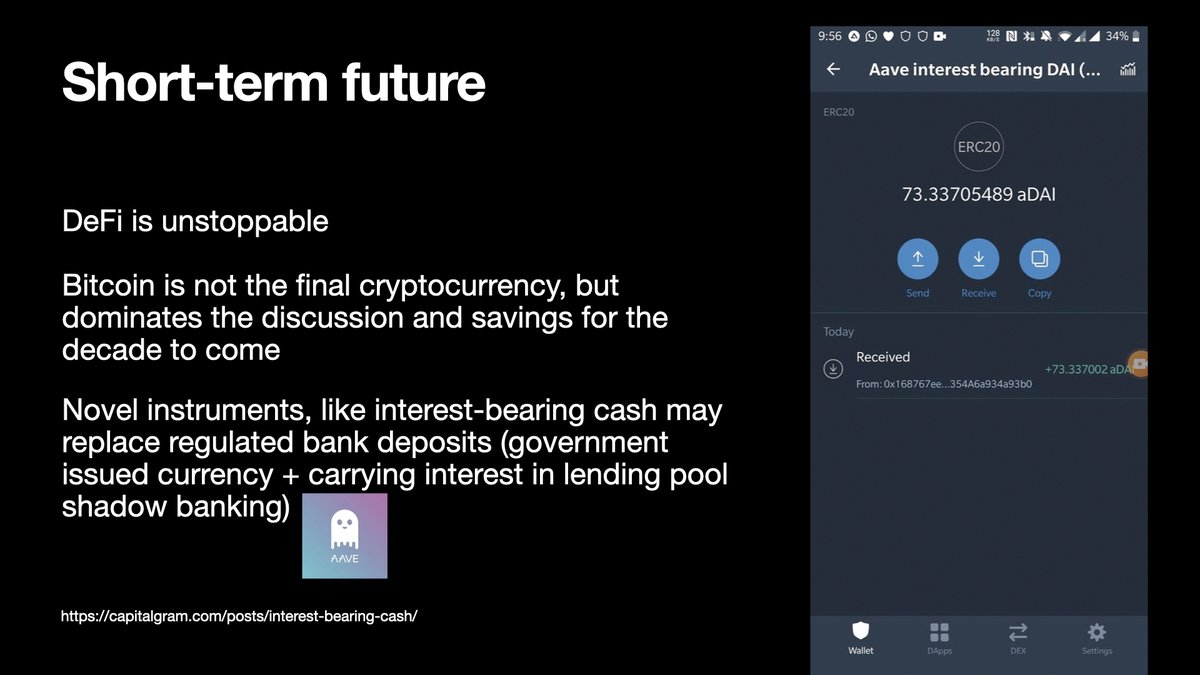 171/ What's going to happen in the short term future?
171/ What's going to happen in the short term future?DeFi is unstoppable unless all crypto is banned. Banning people to invest money as they wish may be a foreign idea in Western cultures, but not in many authoritative regimes.
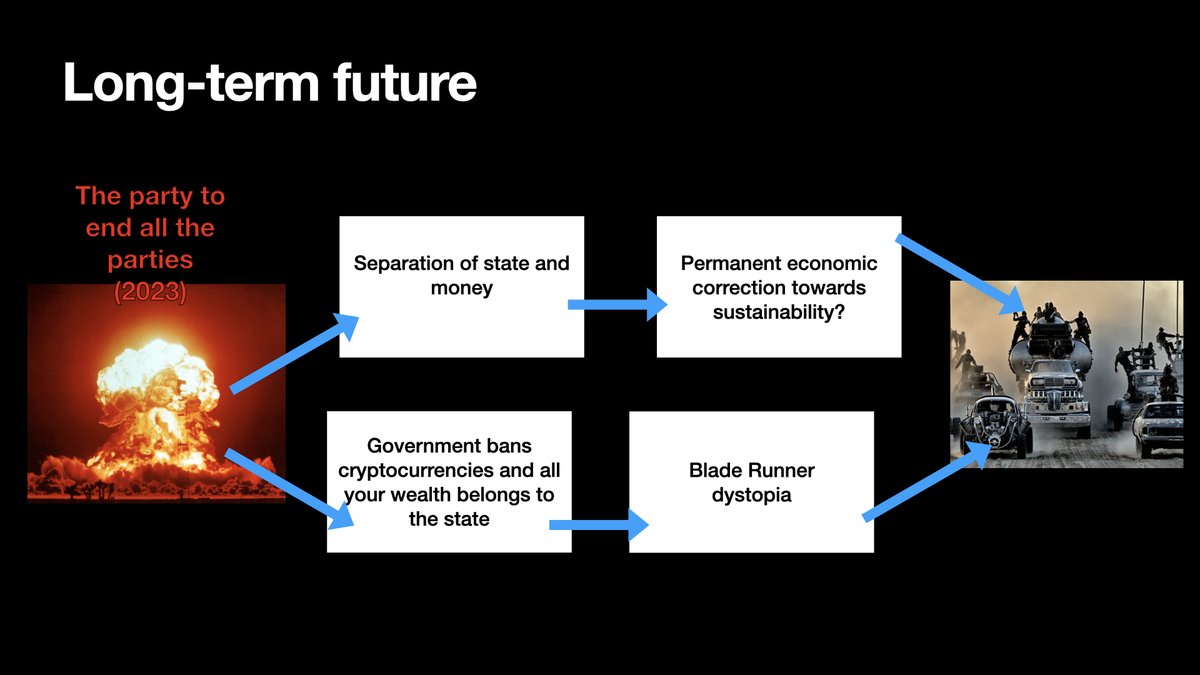 174/ Long term we have few options:
174/ Long term we have few options:Separation of state and money - similar to the separation of state and church in the past.
Young people take away the government's ability to print their own currencies because it will be their self-interest.
Hello modern slavery.
However, I do not see the chain of events that would lead the latter to happen.
My investment advice: "Besides #Bitcoin, buy land near freshwater."
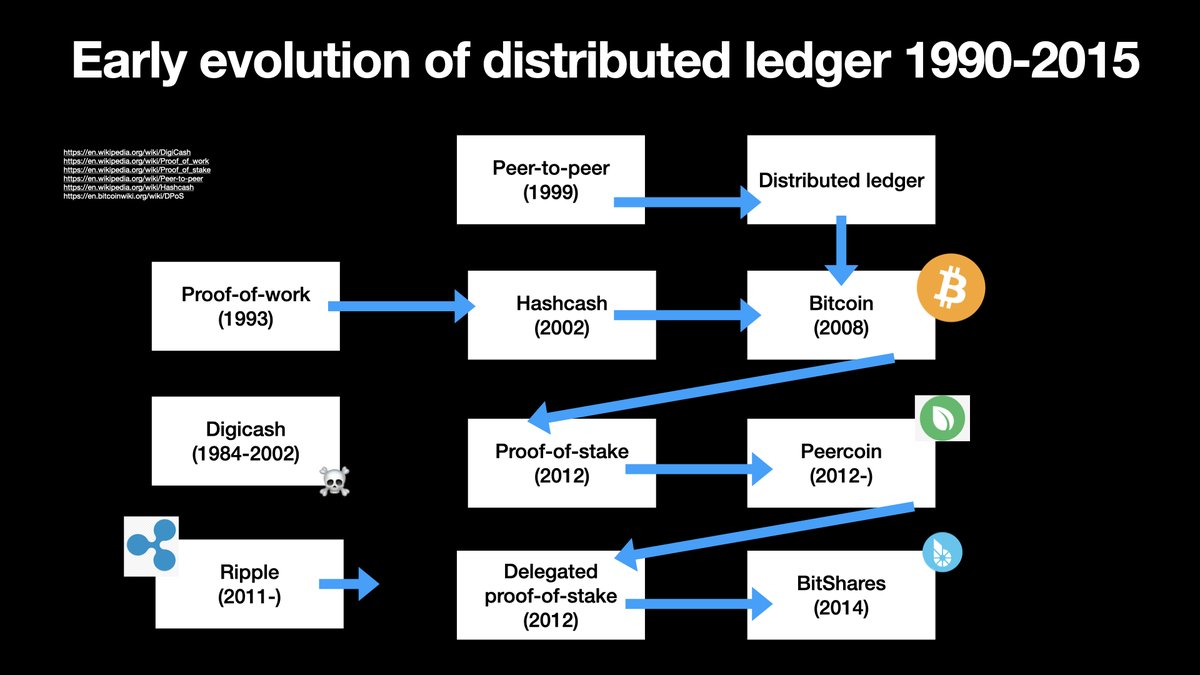
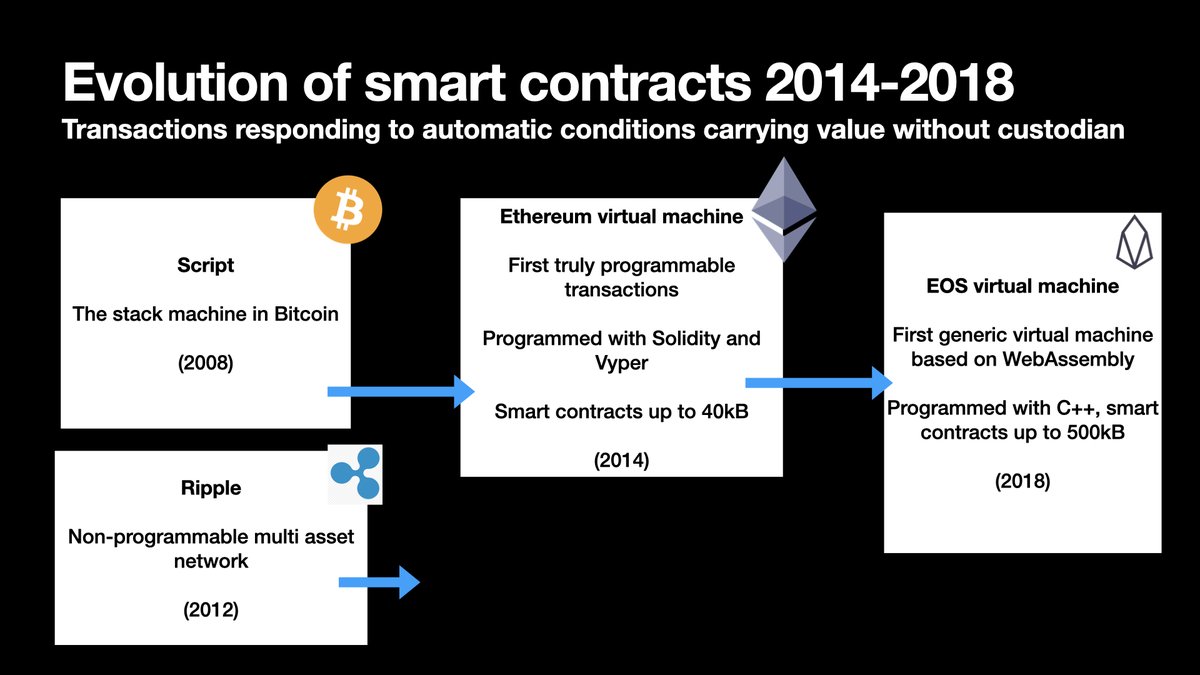
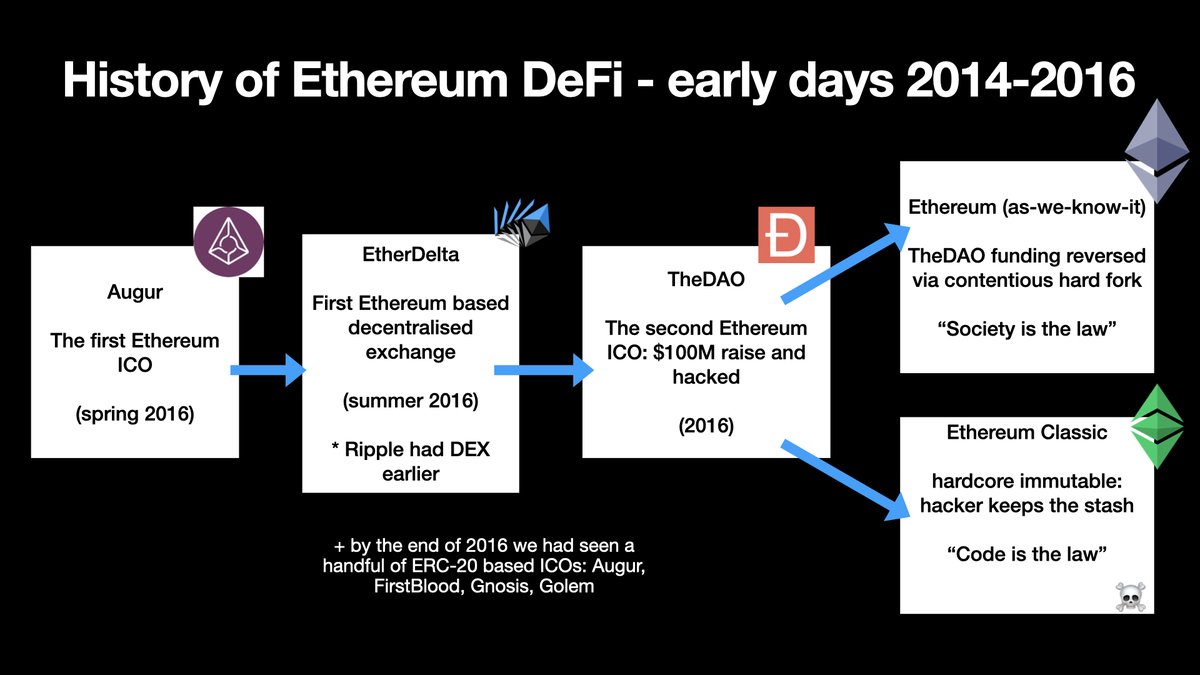
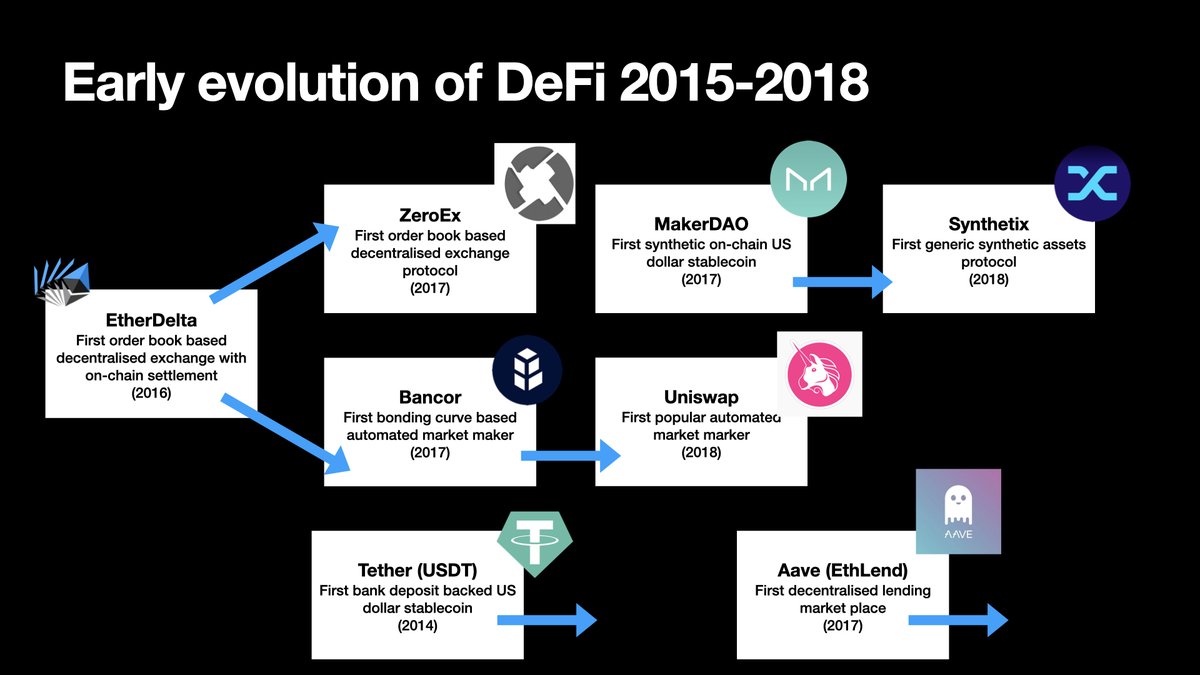
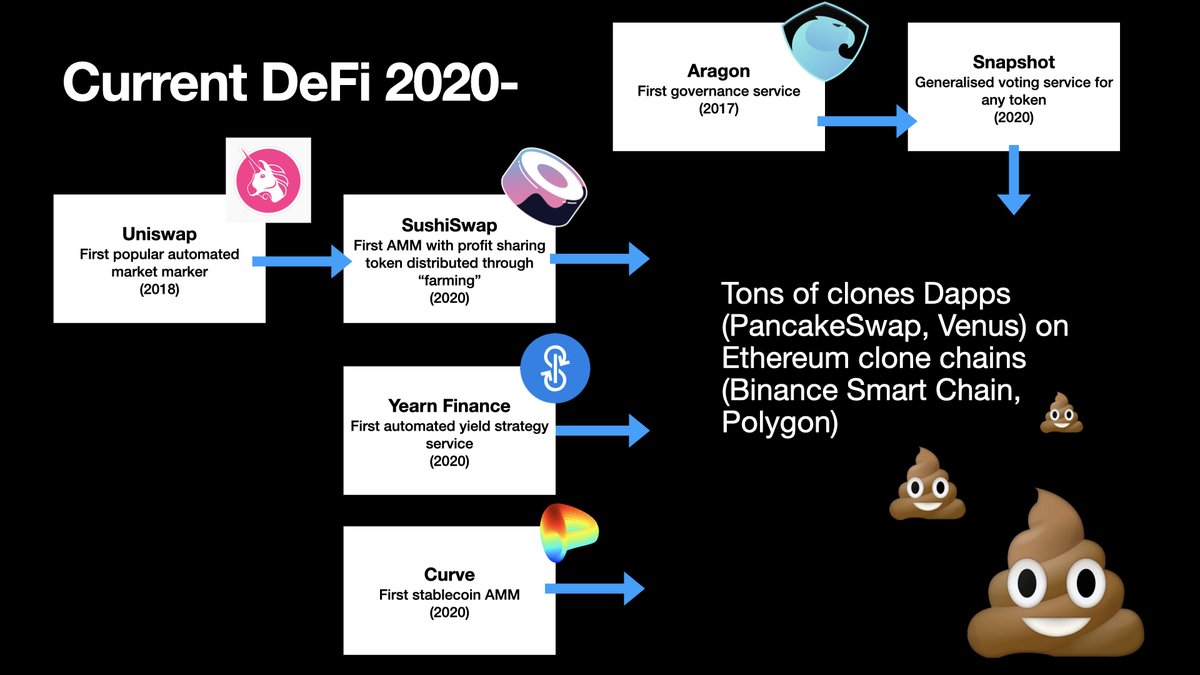
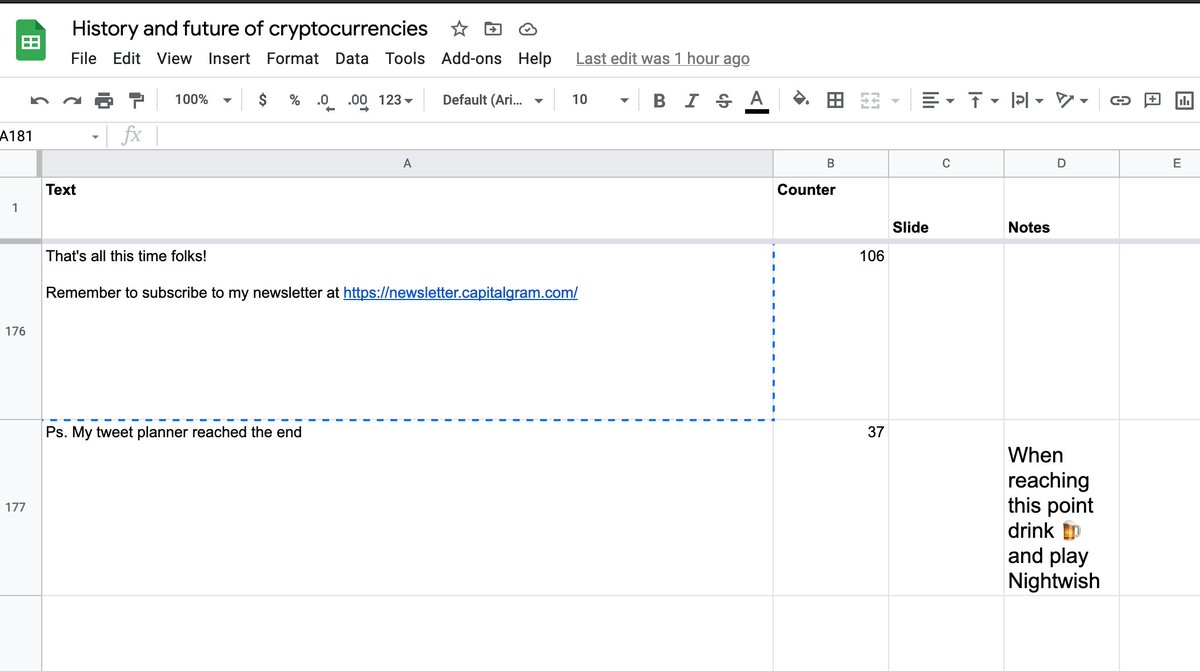

Comments
Send any feedback and comments by replying the Twitter thread.
Discuss